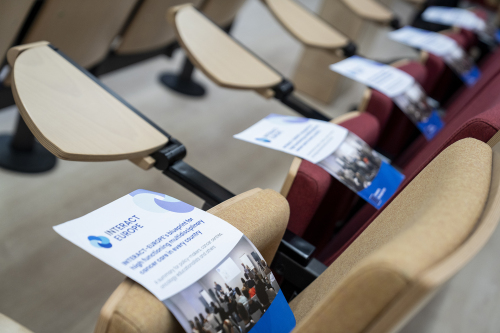INTERACT-EUROPE 100, Work Package 4 - Recruitment and Communication
Leader: EUROPEAN CANCER ORGANISATION (ECO)
Spreading the Word!

The Work Package 4 team is working to ensure the enrolment of the second cohort of the project, creating a cross-border network of ISCTP trainers and disseminate the key learnings and best practices from INTERACT-EUROPE 100.
Since the Kick-Off Event, the team has produced the general Communication and Dissemination Plan (D4.1), which will ensure the coherence of communication and brand elements, as well as assign the right goals to ensure the project has visibility among its key stakeholders.
A new database group has also been created in the secure area of the European Cancer Organisation's website, which will work as an internal communication platform entirely dedicated to the project, as well as a tool for the recruitment of the 100 cancer centres.
Now there are two deliverables in the works:
- Stakeholder Management Plan – (D4.2) will be presented for consultations in May. It contains ideas for engagement and management of stakeholders in the context of the project, together with a mapping and a plan of the project activities.
- Recruitment Strategy – (D4.3), which has been brought forward from Month 8 to Month 6 of the project, which will also be presented for feedback in May and discussed during the Onboarding Meeting of Work Package 4 on 28 May. The Strategy contains criteria, requirements and profiles of cancer centres, trainees and trainers participating into the project. It also builds on the communications plan, and will present specific communication tactics to support recruitment.
We are working on making this progress despite the fact that, at this time of the year, there are many deadlines and meetings, including two important deliverables and an onboarding meeting. With D4.3 being brought forward by two months to allow us to start the recruitment process earlier, we have needed to intensify our efforts through proper consultation with other partners.
The implementation of the recruitment is also presented as a great effort. Defined as one of the risks in the GMA (Grant Management Agreement), the team needs to focus on the actual recruitment of the aimed number of Cancer Centres, which is 100. For this reason, it’s important that Recruitment Strategy takes into account possible barriers and is the most realistic possible, together with defining a clear plan to follow.
Objectives:
Work Package 4 has three main goals:
- Enrolment of Cohort 2: The project aims to expand the ISCTP by enrolling new cancer centres, trainers, and trainees for the second cohort. This objective underscores the commitment to continually enhance and broaden the reach of the training programme.
- Networking of ISCTP Trainers: Creating a cross-border network of ISCTP trainers is pivotal. This objective emphasizes fostering collaboration, sharing best practices, and building a cohesive EU inter-specialty cancer training community.
- Communication and Best Practices Dissemination: The project endeavours to communicate key learnings and best practices from the ISCTP to the wider cancer and healthcare community. This objective reflects a commitment to transparency, knowledge sharing, and contributing to advancements in cancer care.
Description:
The core of this work package is led by ECO, which focuses on creating and implementing a strong communication strategy. This includes identifying target audiences, how to best communicate internally and externally, and involving everyone who should be part of it. Another task is recruiting the second group (cohort) for the ISCTP. This involves a clear strategy to ensure the appropriate people join as trainees and trainers. To strengthen connections, the project plans to organise regional events and a large pan-European networking event. The work package final act is a conference on Inter-Speciality Cancer Training, a place to share successes, exchange methods, and plan for the future with a special focus on including diverse perspectives.
T4.1 Creation and Implementation of a Communication Strategy:
ECO takes the lead in developing a comprehensive communication and dissemination strategy. This includes stakeholder mapping, internal and external communication plans, and a stakeholder engagement plan to ensure active participation and awareness.
T4.2 Recruit Cohort 2:
ECO, in collaboration with consortium partners, designs a recruitment strategy for attracting qualified trainees and trainers. The subsequent recruitment phase involves national partners supporting the enrolment of trainers and trainees, aiming for a broad representation.
T4.3 Networking Events & Synergy Creation:
Regional networking events will be organized to facilitate interaction, knowledge exchange, and the formation of a sustainable training community. National ambassadors, representing various specialties, play a crucial role. A pan-European networking event further enhances collaboration.
T4.4 Conference on Inter-Speciality Cancer Training:
The final conference will serve as a platform to present ISCTP outcomes, methodologies, and recommendations. It culminates in a comprehensive guide for future programme implementation, incorporating diversity and inclusion considerations.
These tasks collectively embody a commitment to not only expanding the ISCTP but also ensuring that the knowledge and experiences gained contribute to a broader impact within the cancer and healthcare landscape.
Deliverables:
D4.1 – Communication and Dissemination Strategy
D4.2 – Stakeholder Management Plan
D4.3 – Recruitment Strategy
D4.4 – Conference on inter-speciality cancer training Report